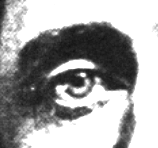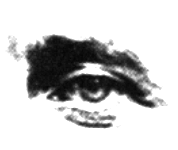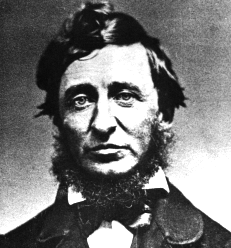The Buddhist

Sometimes, in a summer morning, having taken my accustomed bath, I sat in my sunny doorway from sunrise til noon, rapt in revery, amidst the pines and hickories and sumachs, in undisturbed solitude and stillness, while the birds sang around or flitted noiseless through the house, until by the sun falling in my west window, or the noise of some traveller's wagon on the distant highway, I was reminded of the lapse of time. I grew in those seasons like corn in the night, and they were far better than the work of the hands would have been. They were not time subtracted from my life, but so much over and above my usual allowance. I realized what the Orientals mean by contemplation and the forsaking of works.
One might say that Thoreau was pre-Buddhist in much the same way that the Chinese Taoists were. He forecast an American Buddhism by the nature of his contemplation, in the same way that a certain quality of transparent predawn forecasts a clear morning. He lost himself in nature as the Chinese painters did, by becoming one with nature. He was certainly not the only one of his generation to live a contemplative life, but he was, it seems, one of the few to live it in a Buddhist way. That is to say, he was perhaps the first American to explore the nontheistic
mode of contemplation which is the distinguishing mark of Buddhism. Emerson had abstracted God into the Universe, the Over-soul, or infused Him through Nature with a capital "N." Thoreau was after the bare facts, the hard rock-botton of existence. His journals were filled with details, precise observations and data. Emerson had an idea of what was real, Melville had ransacked the visible world for the symbols behind it, but Thoreau had no theories. He was content to wait and see what was there. There were many gods in Thoreau, as in all the pagans, but precious little God. Deity was not a problem one way or the other for Thoreau; it was more of a function than an absolute principle or existence. "I know that some wilI have hard thoughts of me, when they hear their Christ named beside my Buddha," he wrote in A Week on the Concord and Merrimack Rivers, "yet I am sure that I am willing they should love their Christ more than my Buddha, for the love is the main thing."
There were many gods in Thoreau, as in all the pagans, but precious little God. Deity was not a problem one way or the other for Thoreau; it was more of a function than an absolute principle or existence. "I know that some wilI have hard thoughts of me, when they hear their Christ named beside my Buddha," he wrote in A Week on the Concord and Merrimack Rivers, "yet I am sure that I am willing they should love their Christ more than my Buddha, for the love is the main thing."
Thoreau was profoundly sympathetic, but he was not, in any sense of the word, a convert. He discovered in the Orientals something akin to his deepest spirit rather than another religion to replace the kind of Christianity in which, "The church is a sort of hospital for men's souls and as full of quackery as the hospital for their bodies." If he is with Buddha, he is also with Pan. "No god ever dies," he said in A Week. "Perhaps of all the gods of New England and of ancient Greece, I am most constant at his shrine." He is careful enough to warn us that
- Every sacred book, successively, has been accepted in the faith that it was to be the final resting-place of the sojourning soul; but after all it was but a caravansary which supplied refreshment to the traveler, and directed him farther on his way to Ispahan or Baghdat.
And to make certain we understand his meaning and do not merely trade a Western dogmatic for an Eastern one, he continues,
- Thank God, no Hindoo tyranny prevailed at the framing of the world, but we are freemen of the universe, and not sentenced to any caste.
Yet this political consideration did not turn him from the East. After all, it was neither India nor ancient scriptures which drew Thoreau, but something much closer. "There is an orientalism in the most restless pioneer," he wrote, "and the farthest west is but the farthest east." He felt no need to struggle like Jones or Wilkins to master another language. "In every man's brain is the Sanskrit," was the way he put it. "The Vedas and their Agamas are not so ancient as serene contemplation. Why will we be imposed on by antiquity? And do we but live in the present?"
It was in the present that Thoreau met the Orientals. He did not seek them in another time or place, but he invited them to visit his town.
- As for the tenets of the Brahmins [he wrote] we are not so much concerned to know what doctrines they held, as that they were held by any. It is the attitude of these men, more than any other communication which they make, that attracts us.
The Orientals were ancient only in the sense that they were primeval, as fresh and luminous as "the hour before sunrise," and they were primeval only in the sense that Thoreau was. They lived as forest sages close to the heart of things. They were contemporaries.
 Thoreau's most direct statement of identification with the Indian contemplative tradition came after he had left Walden. "Depend upon it that, rude and careless as I am, I would fain practice the yoga faithfully," he wrote H. G. O. Blake in 1849. "To some extent, and at rare intervals, even I am a yogi."
Thoreau's most direct statement of identification with the Indian contemplative tradition came after he had left Walden. "Depend upon it that, rude and careless as I am, I would fain practice the yoga faithfully," he wrote H. G. O. Blake in 1849. "To some extent, and at rare intervals, even I am a yogi."
Not only Thoreau saw himseIf this way. His friend Moncure Conway also described his Walden life in a similar light:
- Like the pious Yogi, so long motionless whilst gazing on the sun that knotty plants encircled his neck and the cast snake-skin his loins, and the birds built their nests on his shoulders, this poet and naturalist, by equal consecration, became a part of field and forest.
Thoreau's love for the Orientals was well-known to his contemporarles. Thomas Cholmondeley, a young Englishman who had come to Concord to meet Emerson in 1855, could think of no better gift to send Thoreau from England than a collection of Orientalia --- "a nest of Indian books." Thoreau fashioned a case for the collection from river-board he had gathered during his canoe rips on the Musketaquid.
Thoreau died in 1862. When a friend asked him on his deathbed if he had made his peace with God he responded, more like a Zen master than a Transcendentalist, that he was not aware they had quarreled. How deeply he had gone, and how closely his friends identified him with the Orientals, is apparent in the description John Weiss gave in 1865:

- His countenance had not a line upon it expressive of ambition or discontent; the affectional emotions had not fretted at it. He went about like a priest of Buddha who expects to arrive soon at the summit of a life of contemplation.
Came to the Lake
©1981 Shambhala Publications